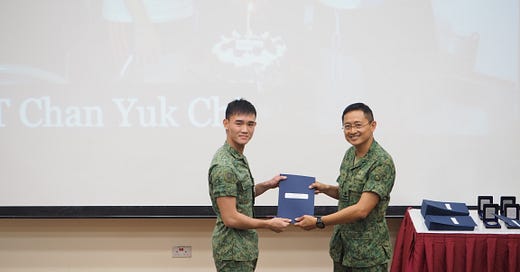When I was training to be an Army officer, a lot of what I was taught to do as a leader was centred around building a good team. That meant recognising, cultivating, and amplifying the traits in soldiers most conducive toward mission success in order to develop strong team dynamics and improve combat effectiveness.
Developing a team is multi-faceted. You have to:
Recognise the value each individual brings to the table;
Manage each person and get them to cohere with each other into a single machine; and
Ensure that you, personally, are always walking the talk, because nothing hurts team cohesion like seeing that the boss doesn’t know his shit.
We as Army leaders are taught from day one that we cannot do this alone. Any task that can be achieved single-handedly can probably be achieved just as easily without needing to put bodies in harm’s way. Team structures, and the institution of the team itself, are therefore just as valuable an asset as any weapon or vehicle.
You don’t always get to pick your teams in the Army. More often than not, you make do with who you have. The challenge is to take that and mould it into something just as effective as any dream team on their best day. And because the stakes are life-and-death, there is no room for error: you either get the job done, or you fuck off and let someone else who can do it take over.
It’s that simple.
By comparison, Startupland isn’t that high stakes. There are rarely any instances in which if you make a mistake, there won’t be at least some opportunity later on (difficulty notwithstanding) where you can redeem yourself. Not to mention, nobody’s trying to shoot you. At the end of every day, you’ll get to go home to a nice warm bed, secure in the knowledge that you can try again tomorrow. Death is a sudden and unforeseen visitor, instead of a known risk to be regularly mitigated.
You also have the benefit of choosing who to work with. Every juncture is laden with choices and freedom. That lack of structure is terrifying in its own way. The military saves the most open-ended tasks for its elite special forces-type operators, because they are trained to be creative in executing their missions. That creativity is necessary because of the nature of the problem. Almost by their very definition, all ‘missions’ in Startupland are open-ended.
Now, hold on a second. I can see your head swelling. Yeah, you. Calm down buddy. Don’t start going around telling people I said you were the special forces of the tech world or whatever. Children who finger paint in kindergarten are called creative too.
The Army is generally constrained by its rigid structures. Success is about achieving objectives within, and sometimes in spite of, the constraints imposed from on-high by the powers that be. Those limitations teach you about the things that are most valuable, the most useful in stressful situations. They are an exercise in cutting through the noise to discover what are the things that really make the difference between success and death.
I hear a lot of debate over what’s most important in a startup: team, investors, idea, product, GTM strategy, which user numbers matter most. I’m not here to answer that question. Instead, I’m here to talk about how to build a good team.
So for those of you who have decided that a good team is the most important quality an early-stage company can have, listen up. You’re who I’m talking to. These are my three lessons on how to pick a good Co-Founder. I know they are true because when I listened to them in the Army, they worked. And because when I didn’t listen to them when first starting up in Startupland, I paid the price.
Get People You Trust
This first lesson is twofold: trust the people you pick, and pick people you can trust.
An infantry company is broken down into platoons, and platoons into sections. Everyone has a role to play. MG gunner, AT gunner, rifleman, radio operator. Most are trained to do at least one other job, but nobody does everything because, for one, it would be physically impossible to carry all that equipment.
More importantly, everything works better when it’s performed by a team. The machine gun team works well because there’s a guy manning the weapon and a guy to feed him rounds and swap out his barrel. A mortar team works well because you don’t just have one guy hauling around a hundred kilos of equipment and ammunition.
But teams only work when you can trust that the other person has your back, in both the sense that they will show up when you need them, and that they know what to do when they get there. If I’m kicking in a door, I need to know that my buddy will be right behind me when we go in and that he’s covering the parts of the room I can’t clear. I have to be able to trust that he’s with me, and that he can shoot straight and isn’t going to trip over himself.
Now, what does trust mean? In our world, it used to mean live ammunition flying overhead and the belief that you weren’t going to accidentally get shot in the back by your friends. It meant giving someone a task and not having to micromanage because you know that they’ll get it done. It meant that there was no place for lone wolves and sayings like ‘if you want it done right, do it yourself.’ Trust meant having confidence in the abilities of your comrades.
I used to have a teacher in school who liked the analogy of parachutes. You have to undergo special training as a rigger to pack parachutes in the military, because the guy making the jump won’t be able to inspect the inside of the chute in advance. If the rigger fails to pack it right, it will fail to deploy, and the jumper might die. Riggers have an enormous amount of responsibility on their shoulders, and paratroopers need to be able to trust that they won’t end up smeared across the ground like strawberry jam after they exit their aircraft.

So the first thing you need with a Co-Founder is trust. You need to believe in them, and they need to believe in you, because this relationship only functions when it works both ways. A bad leader is one that doesn’t trust his team. A bad team member is one that doesn’t trust his leadership.
Obviously there needs to be room for doubt, room to question. If you see someone making a sketchy call, there has to be an avenue to raise your concerns safely and respectfully. But you have to trust that the person you’ve picked knows what they’re doing, and that when you’re crunched for time, you need to have the confidence that they’ll deliver.
Trust is a nuanced thing. Don’t be an idiot blindly following someone because they’ve got advanced degrees or because they talk real smooth. Don’t be a paranoid nut job either. Should you trust everyone? No. That’d be stupid. But if you can’t trust someone, don’t consider bringing them on as a Co-Founder. It’s ultimately more trouble for everyone involved than it’s worth, them included. Same goes for if they can’t trust you.
Professionalism Isn’t Just About Wearing Suits
The term ‘professionalism’ is bandied about a lot. It’s usually interpreted in really stupid ways by really stupid people as meaning mandatory dress codes or being forced to address people as ‘Sir’ or ‘Ma’am’. Let me dispense with this interpretation first.
The military uses uniforms for practical reasons. The strict hierarchy exists for the same. The military is built to win wars and kill people real good. Uniforms help distinguish who to shoot or not shoot. They create a sense of uniformity, of teamwork and belonging, to get you to subconsciously bond with your comrades better. It aids in breaking down barriers. Meanwhile the hierarchy is there because in a combat situation, orders need to be followed or people die, so it cannot ever be in doubt whether or not an order will be complied with.
Hierarchy and uniforms are not what it means to be a professional. These are ultimately organisational tools aimed at making the military more effective at its purpose. In basic training, we had to shout everything and repeat every instruction we were given. If we were told to form up at 1800hrs, we would shout back “1-8-0-0”. The rationale was to build in a habit of communicating loudly, clearly, and simply. It involved zero thought, zero consideration. We would just do it. So that one day, if we’re getting shot at or shelled, we’d repeat instructions we were given clearly so that the message could be passed down the line without the individuals passing it on having to think about it.
So what is professionalism then? It’s as simple as the ability to code switch from whatever it was you were doing before, to whatever you need to be doing to, and get down to business. It’s the ability to compartmentalise and segregate your work from your everything else, and recognise that when it’s time to work, you work. Save everything else for later. Soldiers are professionals when they take their roles seriously, just like in any other job. They are not professionals by virtue of them being soldiers.

This will be relevant for those of you who are considering bringing on friends as Co-Founders. My advice is don’t, unless you know they can work - and preferably if you’ve worked with them before and you know they can get serious.
Founding with friends is part of the startup paradigm: kids getting together in college and building something that changes the world. This is a pernicious myth. They never stay as just kids. They will grow, or perish. So what happens when things get serious, and it turns out one of those kids can’t transition into an appropriately serious mindset? What happens if they are incapable of seeing the others as co-founders, and not just friends?
Well you run into the overfamiliarity problem. That one founder will become too comfortable, start taking liberties with the others that they would never dare to do in any other context, by virtue of the fact that ‘they’re all friends’. You know the type, even if only because you’ve heard it from the many startup horror stories that go along these lines. The ability to raise money does not magically make a founder grow up, and so you end up with companies that have great ideas and maybe even better products, but toxic environments engendered by juvenile, unprofessional founders.
It all comes down to professionalism.
Because professionalism means being able to knuckle down and shift your mindset into one focused on working, one aimed at achieving an objective or mission success. We used to say that however we act off-duty, “once the button is pushed, we’d better be ready.”
Professionalism also means remembering that the people you work with are that: they’re colleagues. Sure, they could be friends or family or whatever, but they’re also colleagues. And when you’re at work, they’re colleagues first, whatever else second. Because when this gets forgotten, you create a vacuum for toxicity to grow.
Or put another way, as founders, you are the leaders of the company, no question about it. You set the standard, the culture. If you’re taking liberties and being less than professional, that sends a message.
So for those of you wondering about a Co-Founder, ask yourself if they can take things seriously. If they’re your friend, can they also see you as a colleague, and you them? Are you able, between yourselves, to establish that work relationship in addition to whatever else you already have?
If your answer was no to any of the above, then give them a hard pass. Real-time left swipe. Work-life hygiene is not something I hear people talk about a lot, but trust me, it matters.

(P.S. Someone should totally make a tinder for co-founders. It would be about as effective as actual tinder for finding love, but damn that would be funny to watch.)
Competency
Finally, this last one’s a no-brainer so I won’t bore you with it. They’ve got to be smart. They need to be able to actually do the job. Whereas having trust has to do with recognising ability, your candidate for co-founder also needs to actually have that ability to begin with.
I’m not going to tell you how to judge this. Look at what they’ve built in the past. That’s usually a solid measure. If you like looking at the number of degrees they have for some reason, sure, go ahead - just be sure you aren’t mistaking ownership of pieces of paper for quality, or character.
There are any number of ways to judge a person’s worth and competency. You have to pick the one that gives you confidence. What I will say, however, is something that shouldn’t have to be said as often as it is: competency means walking the talk. Like I said earlier, it’s bad for morale if the boss doesn’t know what they’re doing.
The way we addressed it in the Army was by training leaders for longer and under tougher conditions, but that’s an inefficient model for the civilian world. As founders, you’ll each have your own strengths - that’s probably why you’re even considering bringing on a co-founder, because you need someone who can do something you can’t. Again, founders don’t need to do everything individually. That’s what teams are for. It’s far better for a founder to ensure that they do their job well and trust everyone else to deliver, than to try to do everything in a mediocre fashion and step on everyone’s toes in turn.

So if you’re picking a co-founder, they ought to be good at the role that you’re bringing them on for. Gee, no shit right? But what’s the benchmark? How do you figure out if someone’s competent at a glance?
Well, ask yourself what else have they got going on for them? Competence, and talent by extension, rarely stays still. This doesn’t mean that you should be wow-ed by a FAANG job or that you should let candidates play fuck-fuck games with you by listing out how many other competing opportunities they have - just that you should ask yourself what else are they up to.
In my experience, the best founders are people who have plenty of other things going on, plenty of other opportunities to pursue, but they’re on their current paths because they chose to be. It was a question of passion. Opportunities follow ability. You don’t want the guy who has no better options. You want the guy who goes with you because he believes in your vision.
And STOP drinking the kool aid. Not every guy who fails college is a secret genius. Sometimes, they really are just fuckups.
Lessons Learned, Lessons Forgotten, Lessons Re-learned
So those are three quick lessons.
Now, I knew all these things when I joined Startupland, thanks to the fact that I’d joined the Army and received expensive government training to hammer these lessons into my thick skull. I was told (and stupidly believed) that Startupland was different. That ‘the real world isn’t like the military’.
What I actually learned is that if something is right, it’s right. Context makes a slight difference but fundamental principles hold true. There are laws of nature. And I learned that the main difference is that the real world contained more dishonourable snake oil salesmen than I was used to.
I’m still getting used to that last one.
The litmus test I use these days now that I’ve made my mistakes and come out wiser is whether I would go to war with this person. Now this is personal to me. I’m sure you’ll come up with a similar type of test.
I ask myself, would I be willing to put my life into their hands, and take their life into mine. Am I willing to give away that power, and am I willing to take on that responsibility? Do I think they can be counted on in that way?
If the answer is no, then there’s no discussion to be had. Maybe there’s another relationship in there somewhere. You can still be casual friends. Not everything has to spin off into a business. Sometimes it’s better to let sleeping dogs lie.
There’s more to picking a good co-founder than these three points I’m sure, but I think they’re just enough to stop you from picking a bad one.
End note: It’s as good a time as any to announce that I’ve left Anchor Orbital, and I’m taking some time out to pursue new ideas and do a little (space) consulting on the side. How do I feel about that?
Well, more details at 9.




